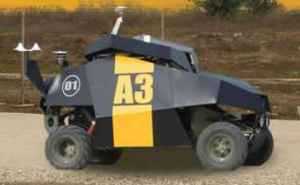 Israeli Military Unveils Armed Patrol Robot
Israeli Military Unveils Armed Patrol Robot
(NSI News Source Info) NES TZIONA, Israel — October 18, 2008: Israel's newest soldier can see at night, never nods off on sentry duty and can carry 660 pounds without complaining.
The Guardium, an unmanned ground vehicle commissioned by the Israeli military and shown to The Associated Press on Monday, is essentially a robotic soldier, among the first in the world to be operational. It can replace human soldiers in dangerous roles, cutting casualty rates.
Like the pilotless drones that have become a mainstay of air forces in Israel, the U.S. and elsewhere, the four-wheeled Guardium is operated from a command room that can be far from the front line.
It can be mounted with cameras, night-vision equipment and sensors, as well as more lethal tools like machine guns.
Following pre-programmed routes, it can navigate alone through cities — the vehicle knows how to deal with intersections, traffic and road markings. It can patrol borders, its cameras scanning 360 degrees at all times, and alert operators if it spots anything suspicious.
The Guardium never mentally wanders or falls asleep, as soldiers have been known to do during mind-numbing guard or patrol missions. And it doesn't have a family that will miss it when it's away on reserve duty.
"Representatives of armies with troops who are taking high casualties in asymmetric warfare from threats like roadside bombs get excited about this product," said Erez Peled, general manager of G-Nius Unmanned Ground Systems, the company that developed the robot.
The control panel includes two large screens and a joystick. If the operator wants to take control, he can do so from a steering wheel and gas and brake pedals that lend the console the look of a video arcade game.
"Any kid who grew up with a PlayStation will be able to come in here and learn this in seconds," Peled said.
A vehicle alone costs approximately $600,000. With the operating system, the price runs to several million dollars, depending on what equipment is installed on the robot.
The Israeli military said the Guardium has yet to enter operational service, and would provide no further comment.
John Pike, director of the Virginia-based military think tank Globalsecurity.org, said there is only one other similar vehicle operational — a South Korean robot used to patrol the demilitarized zone with North Korea.
With the details of the Korean vehicle classified, Pike could not say which was more advanced.
Robots like this are potentially the future of ground warfare, Pike said.
"A robot does what it's told, and you'll be able to get them to advance in ways its hard to get human soldiers to do. They don't have fear, and they kill without compunction."
But more importantly, he said, "A robot means you don't have to write a condolence letter."
No comments:
Post a Comment